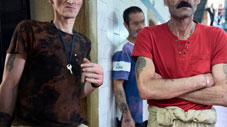
Council of Europe Report Criticizes Prison Conditions and Psychiatric Care in Georgia
By Liza Mchedlidze
Friday, April 25, 2025
The Council of Europe's Committee for the Prevention of Torture (CPT) has raised serious concerns about prison conditions and psychiatric treatment in Georgia, citing persistent informal prisoner hierarchies and inadequate mental health care.
The findings, part of the CPT's 34th General Report, stem from visits to detention facilities across nine former Soviet states, including Georgia. The report highlights systemic issues rooted in historical prison structures that continue to enable abuse and undermine rehabilitation efforts.
The CPT identified a deeply entrenched informal prisoner hierarchy, a legacy of Soviet-era practices where inmates rather than officials control daily prison life. This system categorizes prisoners into rigid groups: Leaders ("Smotriaschij") - High-ranking inmates who enforce unwritten rules, mediate disputes, and sometimes collaborate with prison staff. Ordinary Prisoners - The majority who comply with both official and unofficial rules under constant threat of punishment. "Untouchables" - The lowest-ranking prisoners, subjected to segregation, forced labor, and violence.
The report warns that this hierarchy perpetuates exploitation, intimidation, and criminal activity within prisons, violating the European Convention on Human Rights' ban on inhuman or degrading treatment.
The CPT also criticized Georgia's psychiatric institutions for relying too heavily on drug treatments while neglecting psychosocial therapies. The committee urged authorities to expand community-based mental health services to reduce unnecessary hospitalizations. The report recommends:
Modernizing prison infrastructure to eliminate overcrowded dormitories.
Increasing staff training to reduce reliance on inmate leaders.
Protecting vulnerable prisoners, including LGBTQ+ individuals.
Improving psychiatric care with more therapy and less medication.
The CPT pledged continued dialogue with Georgian authorities to implement reforms. Without urgent action, the report warns, prisons will remain dangerous and ineffective at rehabilitation, undermining justice and human rights.

